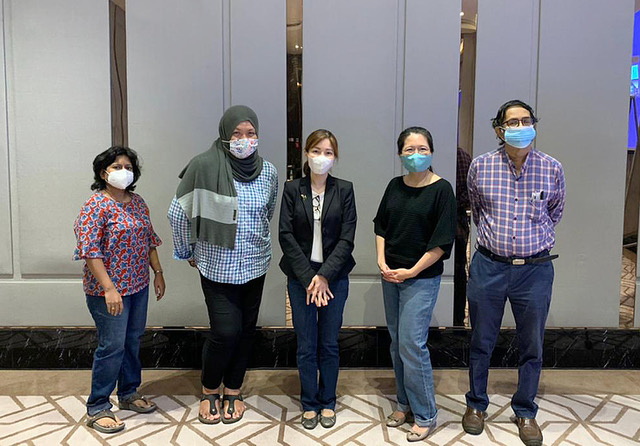Psoriasis is one of the most debilitating auto-immune skin conditions, affecting more than 125 million people around the world. It is not just a “skin problem” but a chronic disease that can lead to psychosocial disorders, comorbidities, and other inflammatory conditions such as psoriatic arthritis which can be life-threatening.
In Malaysia, an estimated 800,000 patients with psoriasis still struggle in silence, faced with challenges in diagnosis and treatment, access to care and social stigma.
On 10 April 2021, three patient-led non-governmental organisations (NGOs) came together to form a coalition called Partners in Psoriatic Care (PPC) to consolidate efforts in improving the quality of life (QOL) of Malaysians affected by psoriasis.
Governed by an Executive Committee, the coalition is a union between the Psoriasis Association of Malaysia (PAM), Psoriasis Association of Johor (PAJ) and Arthritis Foundation of Malaysia (AFM).
A Poorly Understood Disease
For years, patient-led NGOs have been advocating better awareness and improved quality of life for the psoriasis and psoriatic arthritis community. Dr Benjamin Cheah Tien Eang, President of AFM, noted that psoriatic disease, which comprises plaque psoriasis and psoriatic arthritis, is poorly understood even among healthcare workers although it is a common condition.
“Knowledge gaps are one of the reasons general practitioners and primary care physicians delay referring patients to dermatologists and rheumatologists,” said Dr Cheah. “This delay in diagnosis also hampers patient treatment and options.”
According to Major Eugene Clifford Cross, President of PAM, depression and anxiety are high among psoriasis sufferers due to the distress caused by discrimination and social stigmatisation.
“This skin condition makes it challenging for people to get jobs because they are considered as liabilities or persons with disabilities. They also battle poor confidence and self-esteem, which affects their social life, relationships with others, personal development and career progress,” said Major Eugene.
Encik Mohd Faiz Abdullah, President of PAJ, affirmed that the lack of public awareness and understanding has been a constant battle for the psoriasis community. He said: “We are continuously educating and supporting our patients, but it is an uphill battle.
“As independent NGOs, our efforts are not significant enough to create the desired impact. With the pandemic, it is even more challenging to reach out to those in need.”
Making A Difference Together
In 2014, the World Health Organisation (WHO) recognised psoriasis as a serious non- communicable disease (NCD) and called for policymakers to implement solutions to improve the lives of people living with the condition. In Malaysia, however, there is still a long way to go.
“This is the driving force behind PPC,” remarked Dr Thiruchelvam, representative of the coalition’s pro-tem Executive Committee.
“As a coalition, we can leverage on each other’s strengths to create bigger impact. The starting point is for the public to recognise that psoriasis is a serious medical condition,” he said.
Dr Thiru explained that one of the key objectives of PPC is to serve as a national support and advisory group for people with psoriatic disease.
He said: “Apart from disease education, we aim to empower patients and caregivers with the tools to cope with and manage the disease.
“This will be supported with counselling, advice, motivation and friendship through PPC’s network. Patients will also be directed to certified healthcare providers closest to them.”
The coalition also aims to become the advocacy body to increase awareness among policy makers.
Major Eugene explained: “As psoriasis is a lifetime condition, policy makers need to develop a patient-centric, enhanced model of treatment, care and welfare for patients.
“For this to happen, we urge the government to implement the long-awaited National Psoriasis Programme that will ensure better treatment and conditions for psoriasis patients.”
Enhanced Guidelines And Updated Patient Registry
The Ministry of Health has published the Clinical Practice Guidelines (CPG) in 2013 for the diagnosis and treatment of psoriasis. However, the coalition believes an update is long overdue.
“The CPG needs additional information on comorbidities and updates from multi-disciplinary experts. It should include screening guidelines for early detection, especially for psoriatic arthritis, which can be fatal if left undetected,” said Dr Cheah.
The Malaysian Psoriasis Registry was established in 1998 as a cohort study to collect data that would be essential to the research, planning, implementation and evaluation of clinical and health services for psoriasis.
However, as of 2020, only 24,000 individuals out of an estimated 800,000 psoriasis patients in Malaysia are captured in the registry.
Dr Azura Mohd Affandi, Consultant Dermatologist at Hospital Kuala Lumpur and Medical Advisor of PAM said that this is only “the tip of the iceberg” as there are many psoriasis patients not recorded in the registry.
“Notification to the registry is not compulsory and data were contributed mainly from public healthcare facilities,” she said.
“We encourage dermatologists and other health care providers to contribute data to the registry regularly. This will help guide policy makers, pharmaceutical companies and medical providers develop more effective therapies and strategies to improve the quality of service, delivery and policies,” she added.
PPC also aims to expand the capacity of its member NGOs to expand its efficiency and outreach. According to Faiz, the coalition welcomes the participation and membership of other interested parties such as relevant medical associations, government agencies, universities, industry players, NGOs, media and others to foster partnerships and collaborations.
He said: “Upcoming activities include media collaborations, volunteer training, social media engagements, and even contests to capture public interest. Most importantly, the coalition encourages more people living with psoriasis and caregivers to step forward.
“We are committed to empowering the psoriasis community in Malaysia with a voice to speak about their issues. Psoriatic disease goes beyond ‘skin-deep’. We must unite for better psoriatic disease treatment, understanding and care.”
For more information or to join the coalition, contact the PPC secretariat at [email protected] or visit https://www.psoriaticpartners.org







